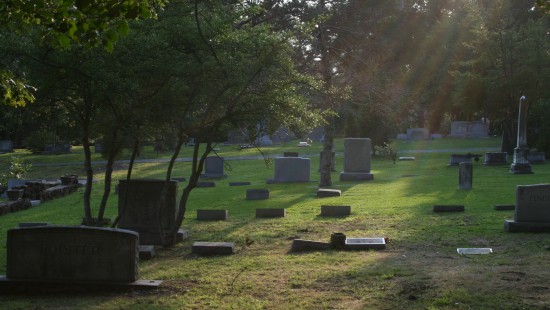 Old Chapel Hill Cemetery, available from
Wikimedia Commons
Old Chapel Hill Cemetery, available from
Wikimedia Commons
I am planning a short vacation out of town this Easter season, and so naturally, death is on my mind.
Okay, obviously, this is not natural for most people. My older brother was killed while I was on vacation several years ago. Though I have healed from the trauma of this event in just about every area of my life, vacations are one of the few "triggers" that still pose some difficulty for me.
The loss of my brother has left an indelible mark on me, as death tends to do for most people. I have learned just how powerful death is, both for better and for worse. My experience of death, though full of extraordinary beauty and growth, has been immensely painful. It has shaken and continues to shake my faith to mere threads at times.
Quite honestly, grief makes Paschal messages like “Death, where is your sting?” seem idiotic. Anyone who has ever grieved knows that death most certainly continues to sting profusely.
But even though Christ's resurrection has not removed entirely the sting of loss and trauma that we experience in death, it has removed the all-important sting of death’s permanence. The resurrection has made new life and healing from grief possible, even though that healing takes the course of a lifetime.
Our response to the Paschal mystery, like that of the myrrh-bearing women, must involve both faith and patience: we must have faith to believe that God is alive and has triumphed over death and then patience to persevere through the times when that triumph cannot be perceived by our lived experience.
These things are not easy. I can tell you that my experience testifies that the way of faith and patience is the only one that makes sense. But that doesn't necessarily make it any easier. When you're lost in the darkness of grief--or just in knowing any of the countless tragedies that happen in our world--finding any kind of faith or patience can feel impossible.
A few Sundays ago, there was a gospel reading about a man who found faith impossible. He had been let down multiple times by Jesus' best men as he sought healing for his son. By the time Jesus came, the man was doubtful, and Jesus called him out on it. But instead of denying what Jesus had said or trying to muster up some kind of faith on his own, the father simply cried out to God, “I do believe, help my unbelief!” and his son was immediately healed.
This gospel teaches us that in those moments where we find faith and patience impossible, the answer is neither to give up nor to pull ourselves up by our bootstraps. Instead, we need to be honest with God about our lack and ask for his help. In the words of an old spiritual director, “It's okay to tell God you don't believe in him or you're angry with him. He can handle it.”
It's kind of funny how mind-blowing that statement really is to many of us, myself included, as though deep down we believe God might just run into a corner and give up if we tell him we're angry with him. God can handle it. He can handle it when the resurrection seems hard to grasp. He can handle it when we feel too fixed to our crosses to tend to an empty tomb. He can handle it when our faith and patience have run dry, and our doubts and anger are overflowing. But we have to allow him to handle these things if we ever want to find healing.
For a beautiful and lengthier discussion on faith and patience, I highly recommend the book Patience with God by Father Tomas Halik. I read this book for the first time in 2009, and it has been fundamental in shaping the way I live and see Christianity post-grief. I can’t recommend it enough.
Support the work we do at CatholicMom.com by purchasing Patience with God through our affiliate link! You pay nothing extra!
Copyright 2015, Brittany Balke
Photography: Old Chapel Hill Cemetery, Ildar Sagdejev, 21 July 2008, used with permission according to the GNU free documentation license, Wikimedia Commons.
About the Author

Guest
We welcome guest contributors who graciously volunteer their writing for our readers. Please support our guest writers by visiting their sites, purchasing their work, and leaving comments to thank them for sharing their gifts here on CatholicMom.com. To inquire about serving as a guest contributor, contact editor@CatholicMom.com.


.png?width=1806&height=731&name=CatholicMom_hcfm_logo1_pos_871c_2728c%20(002).png)
Comments